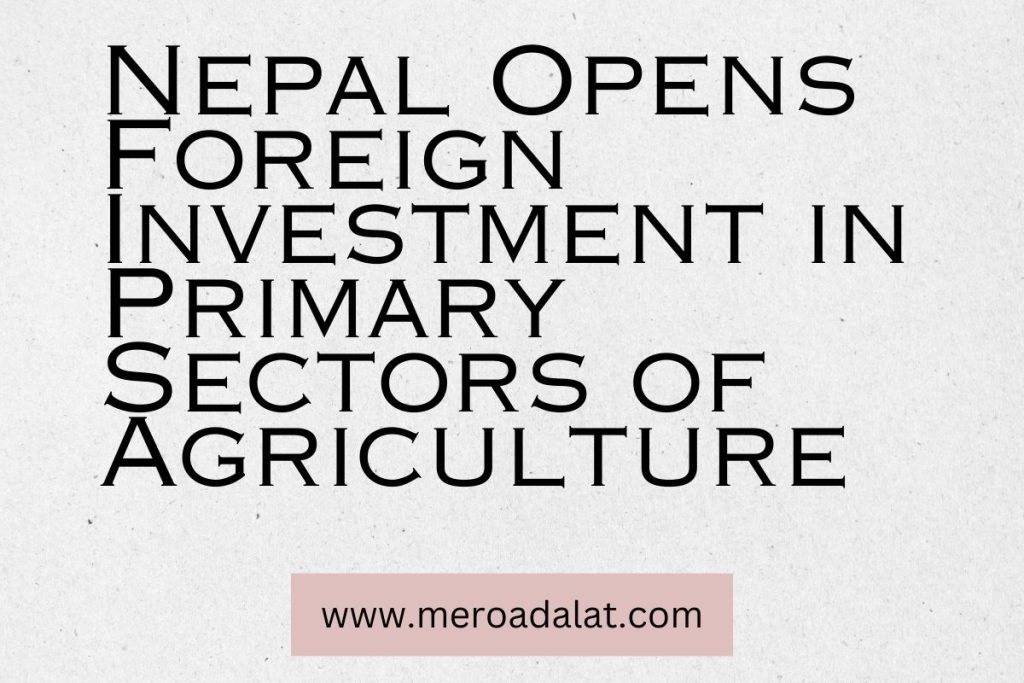This article is all about Nepal Opens Foreign Investment in Primary Sectors of Agriculture.

Introduction to FDI in Agriculture
Foreign direct investment (FDI) refers to the investment made by a company or individual in one country into business interests located in another country. This type of investment involves a long-term relationship and control of the foreign business. FDI plays a significant role in the global economy, facilitating the transfer of technology, skills, and knowledge, and contributing to the growth and development of both the investing and recipient countries. In the following sections, we will explore the impact of FDI on various aspects of the economy and its implications for businesses and governments.
Nepal has recently embraced foreign investment in its primary agricultural sectors. The amendment, declared on January 4, 2021, by the Ministry of Industry, Commerce, and Supplies via the Nepal Gazette, signifies a departure from long-standing restrictions.
This article aims to explore the complexities of this policy change, analyzing its possible consequences, the worldwide conversation regarding foreign direct investment (FDI) in agriculture, and the unique context of Nepal’s agricultural setting.
Evolution of FDI Policy in Agriculture
The Foreign Investment and Technology Transfer Act of 2019, commonly known as the “negative list” for foreign investment, outlined sectors where foreign investment was not allowed.
However, a recent amendment has brought about a change, excluding large-scale industries that export a minimum of 75% of their production from sectors like poultry farming, fisheries, bee-keeping, fruits, vegetables, oil seeds, pulse seeds, dairy, and other primary agriculture areas.
The discussion on foreign direct investment (FDI) in agriculture involves various viewpoints. In the past, capitalist ideas were uncertain about FDI in agriculture, and socialist perspectives strongly opposed it.
However, a change occurred after the global food price increase in 2007–08, prompting interest from food-deficit countries, including Nepal, in using FDI for food security. This shift is influenced by factors like access to land, water, and environmental concerns.
Nepal Opens Foreign Investment in Primary Sectors of Agriculture
Contrary to the belief that a lack of capital is the main hurdle in Nepal’s agriculture sector, motivated youths and corporations are actively investing. The government has also set up subsidized credit facilities for the agriculture sector.
The challenge lies in determining whether Foreign Direct Investment (FDI) can bring significant benefits, considering the existing political instability, landholding structures, and other obstacles to foreign investment.
The past three years were deemed politically stable in Nepal, boosting investor confidence. Nevertheless, recent political upheavals have sparked concerns, affecting the confidence of the business community.
Factors such as the structure of land ownership, labor costs, and other considerations make Nepal less attractive for significant Foreign Direct Investment (FDI). Despite the political stability, only a limited number of foreign-funded agro- and forestry-based industries were registered in the last fiscal year.
Framework for FDI in Agriculture
Creating a successful framework for Foreign Direct Investment (FDI) in agriculture requires implementing strong screening, monitoring, and evaluation mechanisms. It is important to balance attracting foreign investment with protecting national interests, particularly by restricting FDI in priority crops as outlined in the Nepal Trade Integration Strategy for export promotion.
Policymakers must prioritize establishing a safety net to prevent harm to small and marginal farmers, aiming to strike a delicate balance between encouraging FDI and safeguarding local interests. Nepal can benefit from valuable insights gained from other nations that have effectively managed the complexities of FDI in agriculture.
Conclusion
Nepal’s decision to open primary agriculture sectors to foreign investment represents a remarkable shift with implications that extend beyond the agricultural domain. The potential benefits of Foreign Direct Investment (FDI), like bringing in capital and technology, need to be considered alongside the real challenges posed by Nepal’s unique socio-economic and political situation.
As discussions globally evolve on FDI in agriculture, Nepal’s experience will offer useful insights into how foreign investment, sustainable agriculture, and national development interact in a nuanced way.
